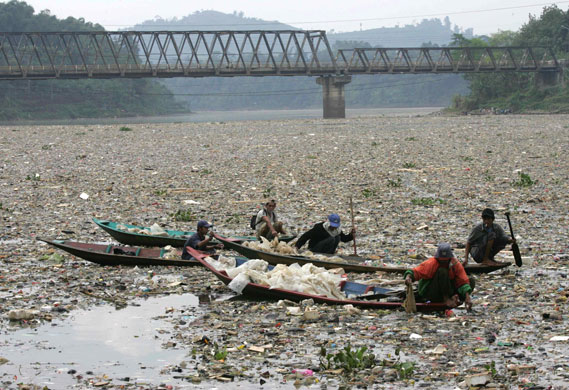This week's 5th International Marine Debris Conference got me thinking.
I used to tell friends that I was concerned about "marine debris." Their eyes would glaze over. They were lost, before the conversation even started. You see, the term doesn't sound like the problem. "Marine debris" sounds like driftwood, kelp. A river choked by fallen trees from a landslide. The term fails at its #1 job: naming. We put names on things to make them real, to make them understandable. To make them fixable. How do you fix "marine debris"?
Another term exists: "plastic pollution." 70-90% of the manmade waste that washes up on beaches is some kind of plastic (see p. 26 of the report). Daily life revolves around plastic; thus, most of what ends up in the ocean is plastic.
More critically, the material that will persist in the ocean is plastic. Cotton, wool, paper, and wood rot. Aluminum & steel oxidize, returning to the building blocks of bedrock. Glass, too, breaks down. Its surface hydrates. The molecules that bond the silica together are replaced by hydrogen, and eventually it breaks back down to silica -- sand.
Plastics don't break down. They break up, into ever smaller shards. Nothing in nature is known to break down plastic. Alkalis don't. Acids don't. Microbes don't. Sunlight doesn't. Oxygen doesn't. Quite simply, plastic persists. For centuries, millennia -- nobody knows. Worse, much plastic is buoyant -- especially #2, #4, #5, and styrofoam (which is simply puffed-out #6 plastic). It looks like food to marine life, and is ingested as food by marine life. Such as the turtle that ingested this:
| All of this was found in -one- dead turtle http://www.seaturtle.org/imagelib/?photo=5456 |
So, why wasn't this conference called the International Plastic Pollution Conference? For some insight, look at the list of sponsors:
In the highest bracket of sponsorship is none other than the American Chemistry Council -- the plastics industry. The plastics industry has links with websites like Save the Plastic Bag, which misrepresent facts to downplay the environmental impact of single-use plastics. The industry spends millions of dollars fighting laws that would even slightly tax & oversee use of plastic bags. The industry came up with the use of the "chasing arrows" symbol to make plastic recycling look like a closed loop, when it's nothing of the sort. The industry is now suing a maker of sustainable, organic shopping bags (Andy Keller, see "other bag news" section) for daring to lay out the facts.
The ACC does not gain by the term "plastic pollution" becoming forefront in people's minds. It doesn't gain by having to support any of the burden for the safe & responsible end of its products' lives. It doesn't gain when consumers use less single-use plastic. The ACC does gain by shaping the discussion in its favor.*
NOAA and UNEP seem to agree. Thus, the 5th International Marine Debris Conference. A place where, in the words of Plastic Pollution Coalition co-founder Daniella Russo, "there is the one who Must Not Be Named... Plastic Pollution."^
A second top-tier sponsor of the conference was Coca-Cola. In 2010, Coca-Cola Amatil, which runs operations in much of the South Pacific, celebrated a large rise in plastic-bottle sales to Indonesia (see p. 11 of report). They also touted a 30% increased capacity to supply Indonesia with more of the plastic bottles. Indonesia has no waste management infrastructure capable of dealing with the increase. It can't handle what it already has. The picture below is the Citarum River in Indonesia, from late 2008.
 |
| From the Guardian newspaper photo essay found at: http://www.guardian.co.uk/environment/gallery/2008/ dec/05/water-pollution-citarum-river |
* For an impressive, and well-researched article on the reach of the plastics industry, it would be hard to beat "Is the Plastic Industry the New Tobacco Industry," by Amy Westervelt, published March 23, 2011.
^ This quote was reported by the Plastic Pollution Coalition's Facebook page on March 24, 2011.

No comments:
Post a Comment